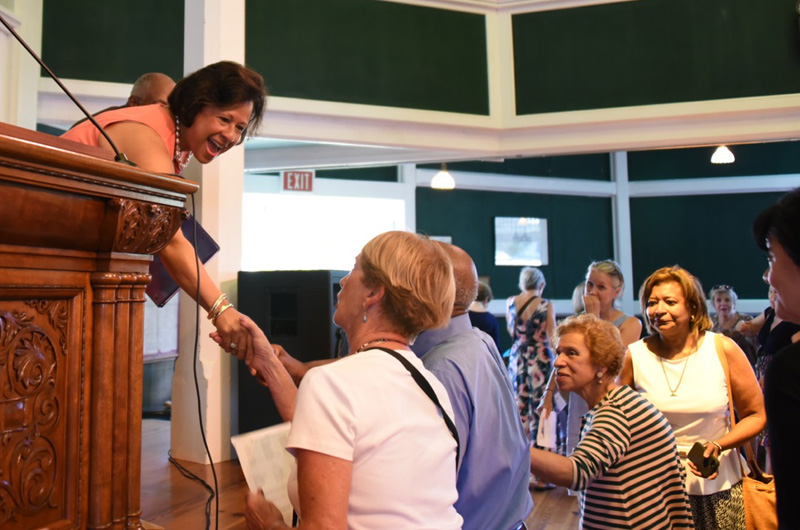During her first year as president of Wellesley College, Paula Johnson found herself in the thick of a national debate weighing the values of free speech against its potential consequences on college campuses.
A talk by Northwestern University professor Laura Kipnis in March had caused a stir, with some Wellesley students taking to social media and elsewhere to challenge her views, including her arguments that college administrations have overreacted to incidents of sexual assault, contributing to a growing sense of vulnerability among female students.
The discussions at Wellesley drew national attention, touching on wider concerns about the limitations of free speech on college campuses, and a U.S. president whose conduct and policies have stoked fear among vulnerable members of society.
At a well-attended service at Union Chapel on Sunday, Dr. Johnson drew parallels between her long career in public health — including as professor of women’s health and professor of epidemiology at Harvard University — and her role as the 14th president of Wellesley College.

“My years in medicine taught me to lead with questions and to listen intently,” she said, as sunlight streamed in through the cupola and illuminated faces in the crowd. “We need to hear what our patients say, even when their words are unclear or halting; even when they have no words.”
The Rev. Larry Green Sr. led the service, which included music by organist William D. Peek Jr. and The Union Chapel Quartet. Mr. Peek performed variations of America the Beautiful, whose lyrics were written by Katherine Lee Bates, a Falmouth native who graduated from Wellesley in 1880.
Without mentioning President Trump by name, Dr. Johnson drew attention to a national climate where many feel threatened by political rhetoric against women and minorities. She said the federal travel ban for people from six Muslim-majority countries and a crackdown on immigration are two examples of “real world” issues affecting college students and their families.
“So many people feel under threat and at risk of imminent harm,” she said. “And no one feels this more than people who already felt vulnerable.”
As a college president, she has had to look beyond the values typically associated with free speech — such as intellectual progress and the protection of citizens from their governments — and consider ways to foster meaningful debate without putting people in danger or diminishing their other rights.
“Where do we draw the line?” she said. “To what extent should we welcome perspectives that for some or many are dangerous or offensive?”
Playing off Franklin Delano Roosevelt’s famous speech in 1933, she said fear itself isn’t the only thing we should fear when it comes to free speech.
“The real danger is where fear leads us,” she said, noting that its physical effects can make us act first and think later. “Our heart rate and blood pressure spike, our breathing quickens. We tend towards fight-or-flight and not open-ended conversation.”
She added that beyond the question of what we say is how we decide what to say in the first place. She recalled seeing the film Jaws many years ago on the Vineyard, and the famous line: “We’re going to need a bigger boat.” When it comes to free speech, she said, “We could use a bigger perspective. And for that, we’d do well to look at our moral and spiritual conditions.”
She noted the universal values of love, kindness and compassion that underlie many world religions.
“One thing I know, we must find ways to move beyond either/or thinking,” she said. “We can be fully committed to freedom of expression and at the same time deeply concerned about the impact of our words on other people.”
Issues of free speech ring loud and clear on college campuses, where students often grapple with tough questions, and learn to navigate a multitude of opinions. Drawing again from the medical sciences, Dr. Johnson pointed to the importance of finding a balance between safe and challenging situations on campus.
“As any number of psychologists will tell you, we grow through challenges that stretch us, not through those that hold us," she said, while also acknowledging the need for some level of protection from the harshness of the real world. "If we truly want to help students grow, we need to be thoughtful in our presentation of highly charged ideas."
A group of student activists at Wellesley recently created a video highlighting what they felt were the shortcomings of campus life. “It was not an easy thing for me to watch,” Dr. Johnson said. Without detailing the contents of the video, she said the students had “called me and others to task in uncompromising terms.”
She later received a letter from a student leader behind the project. “I know my work this semester didn’t exactly make your job easier,” Dr. Johnson said, reading from the letter. “While I’m quick to point out the ways Wellesley can improve, I also know that the support network I gained through my time here, and a deep understanding of myself and my voice, are things I will carry with me throughout the rest of my life.”
The letter filled her with hope, she said, and more than a little pride, in part because it demonstrated a willingness to consider other points of view — an essential skill in navigating the world beyond college.
“She refused to let her very real concerns blind her,” the college president said of the student. “She could fight and fight hard, yet still see through the eyes of loving.”
The service ended with the Battle Hymn of the Republic, after which Dr. Johnson greeted a long line of visitors, while others mingled and took photos before stepping out into a warm summer day.






Comments
Comment policy »